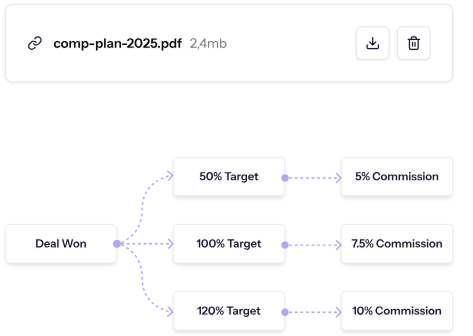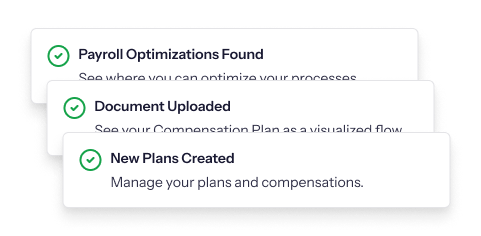Before diving into the “how,” let’s look at the “why.” Automating your commission plans isn’t just aboutconvenience—it directly impacts business outcomes.
Key Reasons to Automate:

If any of these sound familiar, it’s time to make the switch.

Automating commissions means using specialized software to handle the entire process—from tracking deals to applying commission rules and generating payouts.
Automation ensures these complex structures are applied consistently and transparently.
Automated commission systems eliminate human error by applying pre-defined rules consistently. This ensures accurate payouts, reduces disputes, and keeps your business compliant with internal policies and external regulations, fostering fairness and accountability.
Automation significantly cuts down the manual effort required for commission calculations. Finance teams save countless hours each month, allowing them to focus on strategic planning, performance analysis, and scaling sales operations instead of routine tasks.
Sales reps gain instant access to dashboards that show earnings, progress toward targets, and potential payouts. This transparency helps them stay motivated, track their performance, and adjust strategies proactively to maximize results.
As your sales organization grows, manual methods become unmanageable. Automated systems scale effortlessly, accommodating more reps, complex commission structures, and larger deal volumes without sacrificing accuracy or efficiency. Growth becomes smoother and more controlled.
When sales reps are paid accurately and on time, it builds confidence in the system. Transparency reduces friction, strengthens trust in leadership, and boosts morale—keeping your team focused on closing deals instead of questioning payouts.
Automated tracking with AI reveals trends such as who closes the most deals (and why), conversion efficiency, and shifts in SQL/SQO rates—enabling data-driven coaching and smarter incentive design.
With so many platforms available, selecting the right one is critical. Here are factors to consider when evaluating solutions:
Popular tools include Spiff, QuotaPath, CaptivateIQ, and Driven—all designed to simplify commission management.
Successfully automating commission plans requires more than just buying software. Here are best practices to follow:
Even with automation, there are pitfalls to watch for:
One-Size-Fits-All Approach: Tailor commission plans to your companyʼs goals and sales process.
As AI and machine learning become more integrated into sales operations, expect commission automation to get even smarter. Future trends include:
Automating sales commission plans is no longer a “nice-to-haveˮ—itʼs essential for modern, growing businesses. By moving away from error-prone spreadsheets and adopting automated tools, you can save time, eliminate disputes, and empower your sales team with clarity and motivation.
The end result? Happier reps, more accurate payouts, and a sales organization thatʼs built for sustainable growth. If youʼve been bogged down by manual commission management, now is the time to embrace automation and turn your compensation strategy into a competitive advantage.